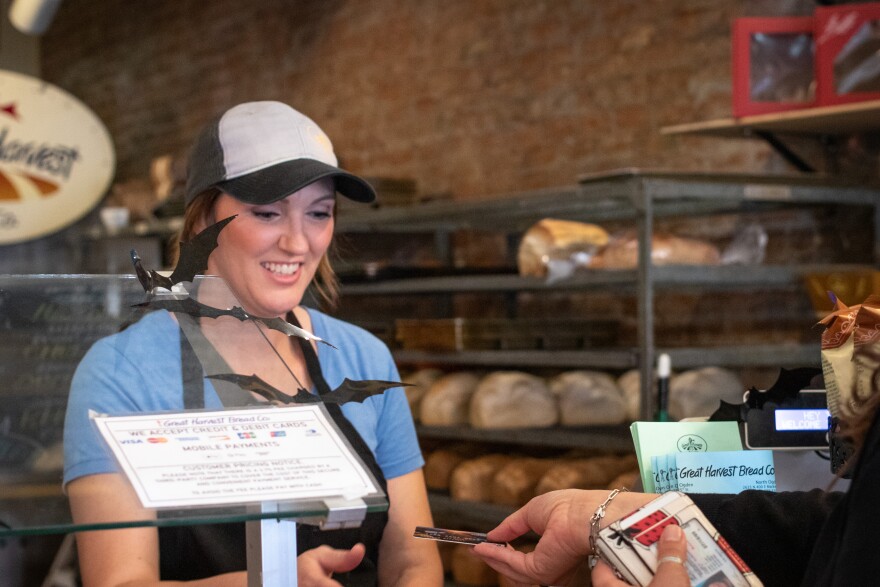Pueden encontrar la versión en español aquí.
__
When Austin Peat was furloughed from his job with the Internal Revenue Service in Ogden, he wasn’t too beat up about it. He initially worried he wouldn’t be able to finish certain tasks as the government shut down.
Now he’s making the best of the unplanned time off.
“My family has a lot of October birthdays, so I've been able to really enjoy those and not have to worry about having to get up so early,” he said. “Or I'm not thinking about, you know, my bullet list of things I'd like to accomplish at work the next day.”
Even on furlough, he feels financially comfortable. And while he enjoys his job — he feels good helping people with their taxes — the negativity outsiders have about the IRS concerns him.
“I think even the executive branch doesn't like it too much either, and so it really sucks to work at a place where a lot of people really don't like you,” he said.
Dan Martinez, legislative coordinator for the local chapter of the National Treasury Employees Union, said even though “paying your taxes used to be this American duty,” the IRS has been villainized.
Speaking as a union representative, he noted that kind of talk picked up with the Trump administration’s DOGE cuts. That put employees on edge.
“All the rhetoric that federal employees were bad — we've been through that now, and there's definitely a hold it close to the vest kind of thing where we have to worry about our savings,” he said. “We have to worry. A lot of folks are paycheck to paycheck.”
The Department of the Treasury is the largest employer in Weber County, as of 2023.
Some employees have been furloughed, some are working without pay and others are still working as normal, Martinez said. Union leaders do not know how many Ogden-based employees fall into each category, but the agency has furloughed nearly half its employees nationwide, according to the Associated Press.
Now the federal government is moving forward with mass layoffs, including at the IRS, according to Federal News Network. The agency laid off workers earlier this year before bringing some back and hiring new employees in September.
In the meantime, Martinez said his coworkers are borrowing from their retirement funds and helping each other apply for unemployment. Some are inviting colleagues over for dinner.
“One of the things that's hopeful from, you know, this shutdown, is seeing the way people rally around each other,” he said.
Still, as workers keep a tighter hold on their wallets, local restaurants are worried.
Susie Zenger co-owns Great Harvest Bread Company in downtown Ogden with her husband. Many of their customers are IRS employees who come in from nearby office buildings. During the 2018-2019 government shutdown, while she was undergoing cancer treatment, her husband worked with a “skeleton crew,” she recalled.
Business has been noticeably slow for a few weeks, she said. They miss catching up with their federal government regulars.
“They've been coming for years. We've known them by name, and I kind of go, ‘Why haven't I seen so and so this week?’ Oh, that's why.”
Zenger said she’s sent her employees home early because there’s no work left for them to do. If things stay this slow, they’ll have to reduce staff even though they don’t want to, she said.

Down the street at No Frills Diner, Ron Yeates serves homemade comfort food in an old-timey setting. The IRS is a big part of the local economy, Yeates said. He recognizes employees’ badges when they grab a bite and has gotten to know some regulars. It’s been a tough few months for his business with nearby construction, he said, but the shutdown is scary.
“I sometimes feel like everything I've worked for is just gonna disappear. It’s very concerning,” he said.
He was looking forward to making up for lost revenue during the holiday season, but the shutdown and furloughs have made him doubt whether that’ll happen.
At The Mercantile on 25th, a casual breakfast and lunch spot also on 25th Street, co-owner Nick Morris has missed some of his regulars during the shutdown. His restaurant is kitty-corner to the federal building, which houses some IRS and Social Security Administration workers.

“There's a personal connection with them now, you know,” he said. “It's just kind of like, ‘Oh shoot.’ Like, ‘We hope this can be quick so they can get back to work and not worry about finances in their personal lives.’”
When one cog in the machine isn’t functioning, he said, that ripples out to the rest of the community.
Macy Lipkin is a Report for America corps member who reports for KUER in northern Utah.






